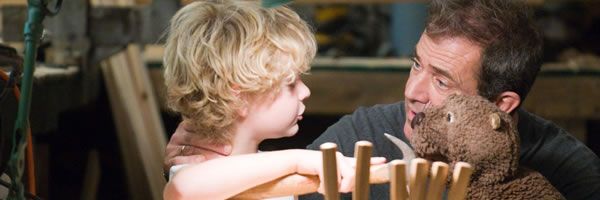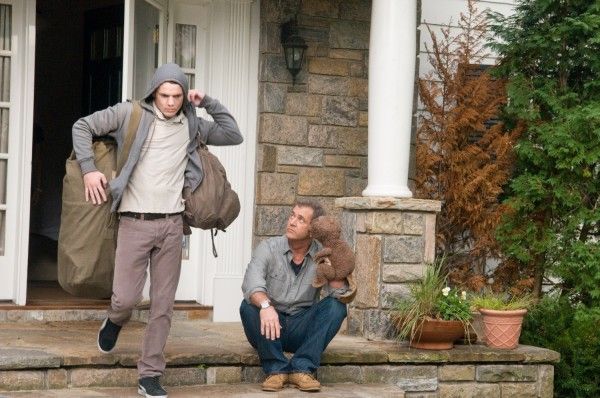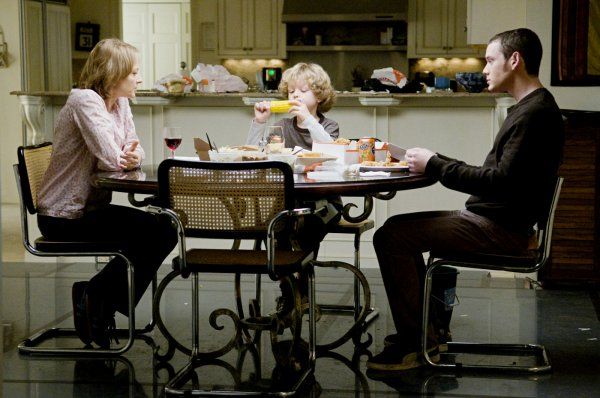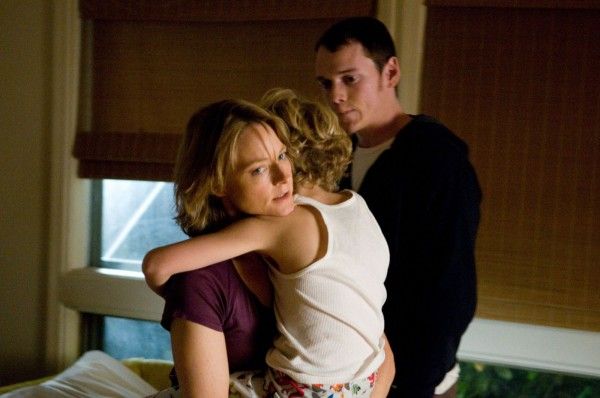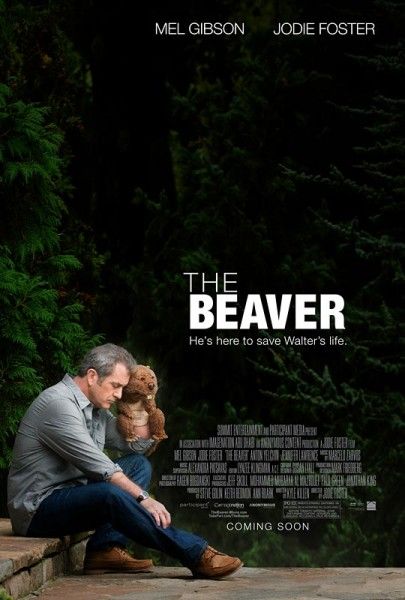Depression is a difficult condition to explore in modern American cinema because no one wants to be around depressed people. We can see characters be sad, but only if they were happy before and will rally and be happy again by the time the movie ends. But an honest look at someone suffering from depression is rare and on that count The Beaver deserves acclaim. Unfortunately, despite the confidence of Kyle Killen's script, director Jodie Foster never manages to bring a thoughtful vision the film. Even worse, no chemistry is developed between the characters, which is a serious issue when you're making an intimate family drama. Individually, the actors do a terrific job, but the story never finds the emotional core that ties them together.
Walter Black (Mel Gibson) has fallen into a deep depression. It's inexplicable and can't be reasoned away. He's read self-help books, he's gone to see therapists, he's taken medication, and nothing helps him. He's simply wants to crawl into bed and sleep his life away. When his wife Meredith (Foster) can't tolerate Walter's depression any longer, she tosses him out. Walter, after picking up some booze, finds a discarded beaver puppet in the dumpster, and decides to take it to his hotel. Despondent, Walter attempts to kill himself but instead trips, falls, gets knocked unconscious, and when he wakes up, he has the Beaver puppet on his hand trying to talk (in a British accent) some sense into him. Armed (literally) with the Beaver, Walter attempts to repair his life by letting hand puppet speak for him and make important decisions.
Alongside Walter's narrative we see the story of his son, Porter (Anton Yelchin). Porter, for reasons never explained beyond presumably being an angry teenager, wants to be nothing like his father, is glad when his mother kicks Walter out of the house, and resents his father's attempts at reconciliation. But Porter, despite keeping a list of every habit he doesn't want to share with his father, has the same ailment: he doesn't speak with his own voice. Porter is adept at writing papers for other students and has a smooth operation going. When Norah (Jennifer Lawrence) asks Porter to write her valedictory speech, he begins to fall for her, but that romance never finds its place in the story.
Despite the silliness of Mel Gibson using a beaver puppet that talks with a British accent, The Beaver is not a comedy. It has some moments of levity, but Foster trusts Gibson to show the depths of his character's suffering. The Beaver is the first Gibson film to come out since the actor's vicious phone tirades against his ex-girlfriend were leaked to the public, and it's the perfect film for him because he's hiding behind a hand puppet. We barely see the real Walter and this distance that's built into the script stops the audience from remembering Gibson's hate speech and instead lets us connect with a man who is so in pain that he's resorted to a drastic measure.
I really liked that The Beaver is courageous enough to not only explore depression, but to attempt a redefinition of sanity. Walter's behavior is inarguably abnormal, but is it insane? He's tried every "sane" remedy and his life continues to go down the tubes. What does he have to lose that he hasn't lost already? Isn't some bizarre behavior acceptable if it means keeping his family?
Unfortunately, it's in Walter's fight for his family that the movie falters. The script attempts to shoehorn in a coming-of-age story for Porter when it needs to keep the focus on the family drama. Gibson and Yelchin hardly have any scenes together but their characters are the heart of the movie. I understand the film wanting to define their relationship through distance, but we never understand why Porter hates his father so much beyond a simple fear of sharing the same depression. And while Foster does a great job of playing out Meredith's reactions to Walter and showing that the character isn't a heartless shrew but simply at her wit's end, there's no chemistry between her and Gibson. I never believed for a second that Gibson, Foster, and Yelchin were part of the same family. It's one thing to show a strained bond, but The Beaver doesn't even give a sense that the bond was ever there to begin with.
Part of that problem lays with the script and part lays with Foster's direction. Foster knows how to get strong performances out of her actors, but she can't make them connect and she fails to bring a strong central vision to the movie. For example, there seems to be no rhyme or reason to her switching between a one-shot of the Beaver talking or using a two-shot of Walter talking through the Beaver. It's an important distinction since Walter's psyche has essentially fractured, but Foster does nothing to demonstrate that distinction.
Foster does an excellent job of conveying the pain of depression and the script deals honestly with the illness and isn't afraid to show how it can destroy a family. Unfortunately, the story lacks focus, the characters lack chemistry, the directions lacks intent, and as a result, The Beaver lacks the emotional punch worthy of its subject matter.
Rating: C+

